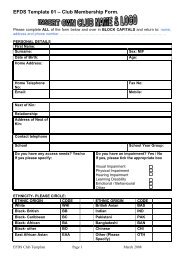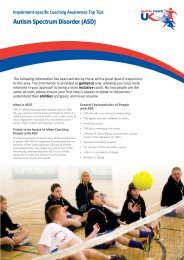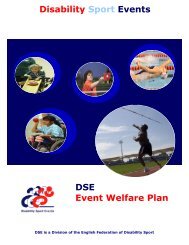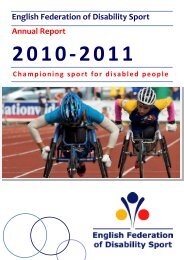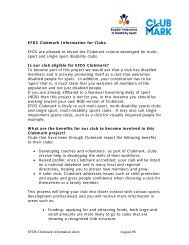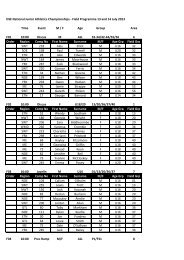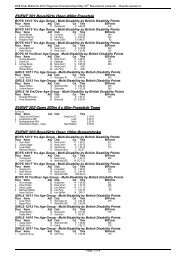OO213 - English Federation of Disability Sport
OO213 - English Federation of Disability Sport
OO213 - English Federation of Disability Sport
- No tags were found...
You also want an ePaper? Increase the reach of your titles
YUMPU automatically turns print PDFs into web optimized ePapers that Google loves.
epilepsy. The ketogenic diet isan incredibly strict high-fat, lowcarbohydratediet. In a bizarre,unexpected stroke <strong>of</strong> grace, itworked. My poor suffering sonwent from having up to 200seizures a day to almost nonein the first three months. He hasbeen virtually seizure-free since.My partner and I have since hadanother son, a healthy toddlerwhom we love as dearly as wedo Owen. He has brought usanother perspective on life. Ourfamily life has come to defineus. The connection we havemakes us stronger – to us, ourlifestyle is normal; we carry on.It’s normal to drive all over townto do physical therapy manytimes a week; it’s normal to haulheavy equipment like standingframes and bath chairs fromroom to room every day. Weknow the children’s hospital likethe backs <strong>of</strong> our hands and arefamiliar with many <strong>of</strong> the topspecialists in various fields <strong>of</strong>paediatric medicine.I call myself my son’s‘personal assistant’ becausehe has a never-endingstream <strong>of</strong> paperwork,funding applications, doctor’sappointments, therapy sessions,check-ups and blood tests. Ido most <strong>of</strong> his personal care,such as feeding and bathing.My partner helps when he can,but he works very long hours tokeep us all afloat financially – sothat I can care for Owen andwe can have a comfortablelife. We try to keep busy on theweekends, doing family thingslike visiting the farmer’s market,going out for Vietnamese foodor checking out a kids’ show.Owen has a pretty fun andbusy life for a 5-year-old. Yetno matter how good things canbe, he has a long and difficultjourney ahead <strong>of</strong> him.We are hoping to place Owenin a mainstream primary schoolwith the support <strong>of</strong> the CerebralPalsy Education Centre, an earlyintervention programme. Owenhas shown vast improvementin communication and movementsince he started goingthere. He also attends activitiesat the Riding for the DisabledAssociation, which we bothlove. Over the years we havespent so much money and timeon therapies and services –some <strong>of</strong> them good, others notthat helpful. We’re learning aswe go, and we’re getting betterat making practical rather thanemotional decisions. It’s stillhard for us, though; I’m alwaysfighting or waiting for somethinghe desperately needs,sometimes for years.The hardest battles have to dowith people’s perceptions <strong>of</strong>Owen. I just want him to betreated and spoken to like aregular kid – but I also want himto receive special attention, andfor people to be more patient.I want my friends and family tohelp him and engage with himmore. Many <strong>of</strong> them tend t<strong>of</strong>ocus on how I am doing or onsomething else that’s less challengingthan Owen’s very realproblems. It’s hard for them,too – with everything he hasgoing on, I sometimes thinkhe should come with aninstruction manual.I’ve <strong>of</strong>ten feared that thethings that defined me beforeI became a caregiver – work,creative interests and a sociallife – have been lost down awell <strong>of</strong> grief and exhaustion.More <strong>of</strong>ten than not, however,I feel like my life before Owenwas born was comparativelysuperficial. Becoming a caregiverfor my own child has beenan overwhelmingly pr<strong>of</strong>oundand joyful experience. We celebratesmall accomplishmentsfeverishly, and my expectations<strong>of</strong> what success entails havebeen smashed and rebuilt intosomething beautifully simple:Owen sitting unaided for fiveseconds, or, as he watches theParalympics on television, hearingthe words ‘cerebral palsy’and ‘champion’ in the samesentence. I have grown throughcaring for Owen – above all,perhaps, in my ability toempathize.I have learned that no matterwhat a child can’t do, she or hewill still always have an identityand a character that will leavea distinctive brushstroke onthis world. If we want to be anenlightened society, our job isto believe and encourage. Onlythen can children who havesuch difficult limitations grow.And then we can all come tosee that things that ‘go wrong’are sometimes just different –and <strong>of</strong>ten amazing.A STRONG FOUNDATION35



